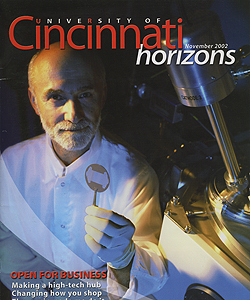"My 82-year-old mother knew how to use browsers and bookmarks before I was born because the radio is simply a browser that browses AM and FM as opposed to WWWs, and the buttons on the car radio are clearly bookmarks. Yet despite all of our great advances, she can't use computer-based browsers and bookmarks because she doesn't understand the skill-set required. That is the fault of bad design."
"Cell phones in cars cause problems because of rotten design and technology. Imagine you're driving at 80 miles an hour listening to the stereo, when your phone rings. In my world, the phone and car can talk, so the car turns down the stereo and transmits the caller through the car speakers, while a microphone in the steering wheel listens to the driver. My eyes have not left the road, nor my hands, the steering wheel. Talking in a car isn't dangerous; it's a design problem."
"Bash your camera open, and you'll find more computational power than the first PC you owned. The digital camera is the most popular-selling computer right now. It just happens to be a different kind of computer -- light in and chemistry out."
"No significant progress in the personal computer's conceptual design has occurred since 1982. I can show a photograph of a 1982 computer, in which most computer users cannot identify the decade the photograph was taken. I would argue that this machine was better designed from an ease of use than most modern computers. So we may even have regressed in the intervening 20 years."
"I'm often captive beside this multimedia computer that takes in credit cards and puts out petrol. The gas pump knows my credit card number and what time of day it is. Optical sensing could tell it what kind of car I have and the weather. Compelling info-tainment on the screen could get me to place a fast-food order from a restaurant in the unutilized service bay, and the food could be charged to my credit card and delivered to me by the time I'm finished pumping. The point is that's not a gas pump; it's a computer."
"Where your CD collection and your stereo are indicates where you consume music. If it's not where the computer is, then who cares if I can download music? It's the right solution in the wrong space. Any Anthropology 101 student can tell you this."
"Paper will be electronic within seven to 10 years. You will be able to wallpaper your house with electronic displays that are six millimeters thick, cost less than wallpaper and have better resolution than your laptop. You will be able to read things in the bathtub that look and feel like books, but can be erased, then have new stuff copied onto them. These types of systems are already happening."
"According to God's Law, our neurons do not fire any faster and our memory doesn't increase in capacity as time progresses. The capacity of humans beings is limited. Yet the great engineers of the world benevolently promise more and more blue sky every Christmas, without delivering functionality within the bounds of God's law. Any functionality above that lies in the Threshold of Frustration and does not exist in human terms. I don't care if you can show me the documentation; it doesn't exist, except as a gimmick for selling a product."
"Visible design is a failure. The only good computer is an invisible computer. Successful designs integrate seamlessly into the ecology. If a designer gets recognition, you've failed."
"Our academic institutions and funding agencies are set up to reinforce a silo mentality between the science community and arts and humanities. The skill sets of all these disciplines must be effectively applied in concert to achieve the potential waiting to be exploited."
-- interviewed by Deborah Rieselman

 Past Issues
Past Issues
